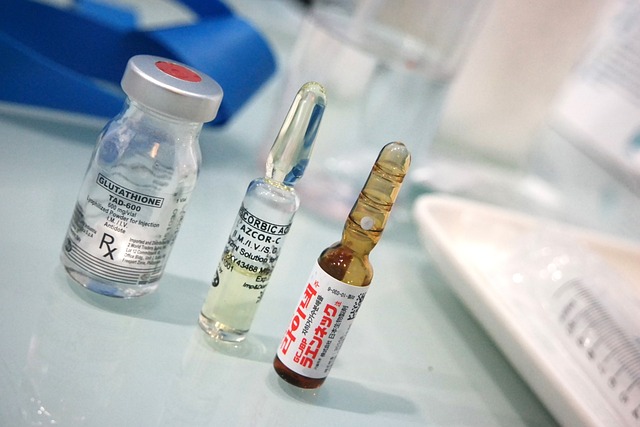Patient adherence to semaglutide injections is crucial for effective diabetes management. The semaglutide injectable form offers a convenient once-weekly dosing schedule, improving patient satisfaction and consistency. Healthcare providers can enhance adherence through education, open communication, addressing concerns, and tailored support. By empowering patients with knowledge and practical guidance, they can ensure optimal utilization of the semaglutide injectable form, leading to better blood glucose control and improved quality of life for diabetics. Regular monitoring and personalized care, coupled with technological innovations, further strengthen patient-provider partnerships and revolutionize diabetes treatment.
Patient adherence to injections is a critical aspect of effective diabetes management. This comprehensive guide explores key factors influencing how patients respond to semaglutide, a groundbreaking injectable form in diabetes treatment. We delve into strategies to enhance education, address common concerns, and optimize healthcare provider roles. Additionally, we discuss monitoring progress and future personalized approaches to improve adherence, focusing on the unique challenges and benefits of the semaglutide injectable form.
Understanding Patient Adherence: The Foundation of Effective Treatment

Patient adherence, a cornerstone in healthcare, refers to the extent to which patients follow their prescribed treatment plans. When it comes to semaglutide, a medication often administered through injectable forms like injections, understanding and enhancing patient adherence is paramount for achieving optimal therapeutic outcomes. Non-adherence can lead to suboptimal blood glucose control, increased risk of diabetes complications, and reduced quality of life for patients with type 2 diabetes.
Healthcare providers play a crucial role in fostering adherence by educating patients on the importance of regular injections, addressing any concerns or barriers, and providing clear guidance on administration techniques. This approach, tailored to individual patient needs, forms the foundation for effective treatment, ensuring that patients not only understand their medication regimen but also feel empowered to adhere to it consistently.
Semaglutide Injectable Form: A New Paradigm in Diabetes Management

The advent of semaglutide injectable form represents a significant advancement in diabetes management, offering patients an alternative to traditional insulin regimens. This novel therapy delivers a long-acting glucagon-like peptide-1 (GLP-1) receptor agonist, providing sustained blood glucose control throughout the day and night. Its once-weekly administration simplifies patient routines compared to multiple daily injections or continuous insulin infusions.
This injectable form of semaglutide has shown remarkable efficacy in reducing HbA1c levels, with clinical trials demonstrating its ability to achieve glycemic targets while minimizing hypoglycemic events. Furthermore, its convenience and user-friendly packaging enhance patient adherence, encouraging consistent use and improved diabetes management.
Factors Influencing Patient Response to Injections: A Comprehensive Overview

Patient response to injections is influenced by a multitude of factors, each playing a crucial role in determining adherence and treatment outcomes. One prominent example is the type of injectable used, such as the semaglutide injectable form, which has shown promise in improving patient acceptance due to its once-weekly administration schedule compared to daily or more frequent injections.
Beyond the medication itself, contextual elements like injection techniques, pain perception, and healthcare provider communication significantly impact patient response. Effective education about the procedure, addressing concerns openly, and minimizing perceived discomfort can enhance patient satisfaction and adherence. Additionally, social and cultural beliefs, along with personal health literacy and previous experiences, shape individual reactions, underscoring the importance of tailored, empathetic care.
Enhancing Patient Education for Improved Injection Adherence

Patient education plays a pivotal role in enhancing adherence and response to injections, especially with medications like semaglutide, available in its injectable form. Healthcare providers should take the time to educate patients about the importance of their prescribed treatment, explaining the benefits and potential side effects. A simple, clear demonstration of the injection process can demystify the procedure for many patients, reducing anxiety and increasing comfort levels. This approach fosters trust and encourages patients to actively participate in their healthcare.
By providing detailed information tailored to individual patient needs, caregivers can empower them to make informed decisions. Encouraging open communication ensures patients understand the significance of consistent dosing and timely follow-up injections. This education goes a long way in ensuring patients receive the full benefits of semaglutide therapy and are better equipped to manage their health effectively.
Addressing Common Concerns and Barriers to Injection Administration

Many patients have concerns or barriers when it comes to receiving injections, especially with newer medications like semaglutide in its injectable form. Common worries include pain, fear of needles, and practical issues such as access to healthcare facilities or a lack of support from caregivers. To improve patient adherence, healthcare providers should address these fears openly and provide reassurance. Educating patients about the benefits of the treatment and offering alternative injection techniques or pain management strategies can help reduce anxiety.
Additionally, making the administration process as convenient and accessible as possible is essential. This could involve ensuring a comfortable clinical setting, providing clear instructions for self-injection at home, and offering training sessions to build confidence in patients who prefer more control over their treatment. Tailoring these solutions to individual patient needs can significantly enhance adherence and overall satisfaction with semaglutide therapy.
The Role of Healthcare Providers in Optimizing Semaglutide Therapy Outcomes

Healthcare providers play a pivotal role in optimizing outcomes for patients undergoing Semaglutide therapy, particularly those using its injectable form. By thoroughly educating patients about the medication’s benefits and potential side effects, healthcare professionals can enhance adherence to the treatment plan. Regular follow-up consultations allow for continuous assessment of patient experiences, addressing any concerns or challenges they may face during self-administration of semaglutide injections.
Additionally, providers can offer practical guidance on proper injection techniques, ensuring patients learn how to inject the medication correctly and safely. This hands-on approach not only improves adherence but also fosters a sense of empowerment among patients, encouraging them to actively participate in managing their health condition effectively.
Monitoring and Evaluating Patient Progress: Ensuring Long-term Compliance

Monitoring and evaluating patient progress is a critical component of ensuring long-term compliance with injection treatments, such as those involving semaglutide’s injectable form. Healthcare providers play a pivotal role in this process by regularly assessing patients’ adherence to their medication regimens. This involves tracking the frequency and timing of injections, understanding any challenges patients face, and providing ongoing support and education.
Through structured follow-up visits and patient reporting, healthcare professionals can gauge the effectiveness of treatments, identify potential non-adherence issues, and make necessary adjustments to care plans. This proactive approach not only improves treatment outcomes but also fosters a sense of partnership between patients and their care teams, ultimately enhancing long-term compliance with semaglutide injections or similar therapeutic interventions.
Future Perspectives: Personalized Approaches to Improve Semaglutide Injectable Adherence

Looking ahead, personalized approaches hold great promise in enhancing patient adherence and response to semaglutide injectable forms. By tailoring treatment plans to individual needs and preferences, healthcare providers can improve patient satisfaction and engagement. This may involve educating patients about the unique benefits of semaglutide, addressing any fears or misconceptions surrounding injections, and offering flexible dosing options or alternative administration methods.
Technological advancements, such as digital health platforms and mobile apps, can also play a crucial role. These tools can serve as reminders, track injection frequency, and provide personalized feedback, fostering better patient-provider communication and adherence to treatment regimens. Ultimately, combining individualized care with innovative technologies has the potential to revolutionize semaglutide injectable therapy, leading to improved clinical outcomes and enhanced quality of life for patients.
